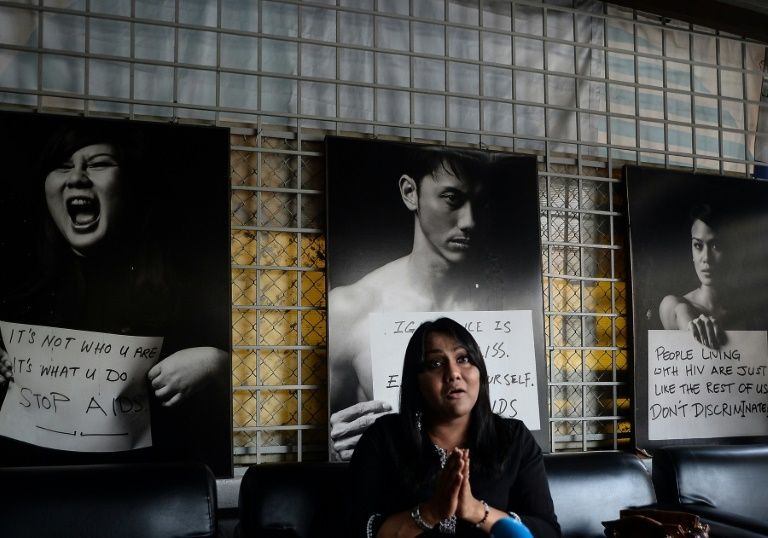
Malaysian transgender woman Nisha Ayub was arrested in 2000 by the feared state religious enforcers who swoop on Muslims suspected of “un-Islamic” behaviour. Photo by AFP
Nisha Ayub has endured virtually everything thrown at Muslim-majority Malaysia’s repressed transgender community: contempt, violence, arrest and sexual assault in a prison where she was sent to become a “real man”.
She has attempted suicide, beaten down by strict Islamic laws that activists say subject transgender people to increasing legal constraints, discrimination and marginalisation.
“The way they treat you is like you don’t have any rights, you don’t have any dignity,” said Nisha, 37, dressed in the flowing skirt and long-sleeve shirt favoured by Malaysian Muslim women.
But she channelled the fury over her mistreatment into advocacy, and has become the country’s most prominent LGBT activist, despite the personal risk that entails.
In March she became the first transgender woman named one of the US State Department’s International Women of Courage, which recognises those fighting for rights and equality.
A Muslim, Nisha’s first overt gender-identity expression came at age nine in a costume contest at her straight-laced boy’s school — she dressed as a ballerina.
Years of family and societal rejection followed, she told AFP at SEED Foundation, an NGO she runs in a crime-ridden neighbourhood in the capital Kuala Lumpur.
In 2000, just 21-years-old, she was arrested by the feared state religious enforcers who swoop on Muslims suspected of “un-Islamic” behaviour.
A sharia court — which handles civil-religious matters involving Muslims — jailed her for three months under an anti-crossdressing law.
Nisha said she had fully transitioned to a woman by then, although like many in the transgender community she did not disclose details which are considered private. However, she was sent to a men’s prison.
“So that I can come back as a real Muslim man,” she ruefully recalls the judge saying.
Bald-shaven, she was mocked and repeatedly made to bare her breasts for other inmates. Once, several prisoners forced her to perform oral sex on them.
– Threat of violence –
She attempted suicide in prison, and again after release. Traumatised, she drifted briefly into sex work, like many others in her situation.
Human Rights Watch said in a 2014 report that Malaysia was “one of the worst countries” in the world for transgender people.
Advocacy provided Nisha a lifeline.
In 2010, she co-founded Justice For Sisters, which highlights trans persecution and, four years later, SEED Foundation, which assists transgender people, sex workers, HIV sufferers and other marginalised groups.
Transgender is the umbrella term for individuals who identify with a gender different to their sex at birth.
While there are no official figures for Malaysia, transgender women are commonly seen — especially in the capital Kuala Lumpur — working in restaurants and retail outlets.
But violent attacks remain an ever-present threat. One recent assault left a transgender woman in a brief coma, Nisha said. The attacker was fined just 400 ringgit ($100).
“And not just that, he entered the court wearing a homophobic t-shirt,” she said.
Many transgenders fear seeking police help over abuses, and Nisha advises victims on where to turn if attacked or arrested.
Despite a thriving underground gay scene, homosexuality also is forbidden in Malaysia, where laws criminalising sodomy can result in imprisonment, corporal punishment, and fines.
Many keep their sexuality private even from their families. A 2015 HRW report said discrimination against such groups was “pervasive”.
But Nisha believes the situation is worse for the nation’s transgender community.
“You could see a gay person, or a lesbian, and not know they are. But usually with a transgender person, you can see,” she said.
– No fear –
The State Department award recognised her courage and “deep sense of humanity”, the US Embassy in Malaysia said.
Activists says Nisha was instrumental in engineering a court challenge to an anti-crossdressing law in Negeri Sembilan state.
That led to a landmark 2014 ruling that called the law, which can bring three years’ jail, “degrading, oppressive and inhuman”.
The victory was later thrown out on an obscure technicality, but attorney Aston Paiva, who argued the case, called it a building block for future challenges. – AFP
